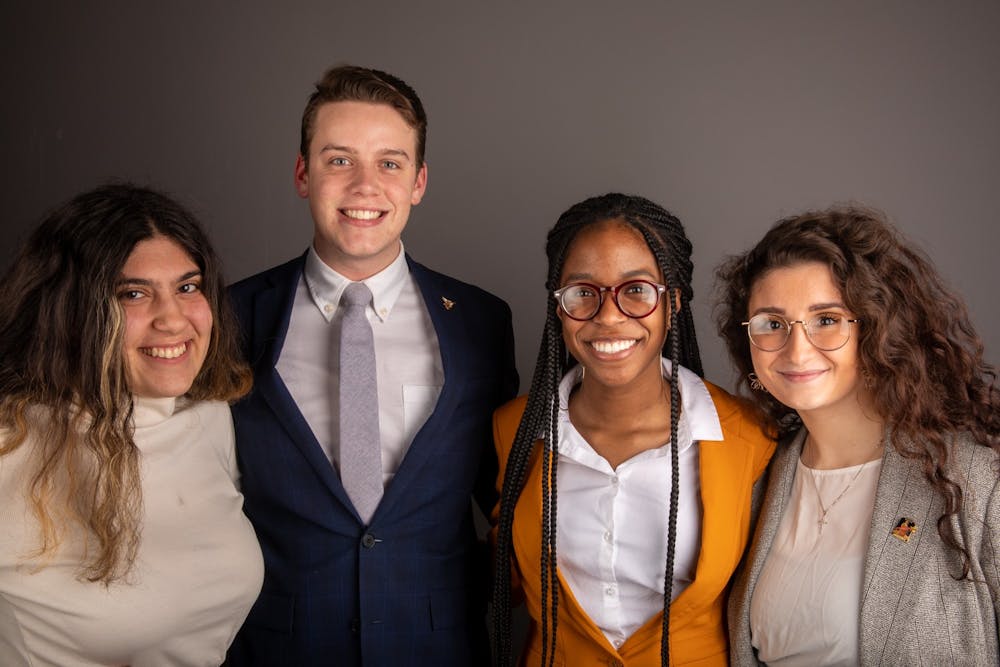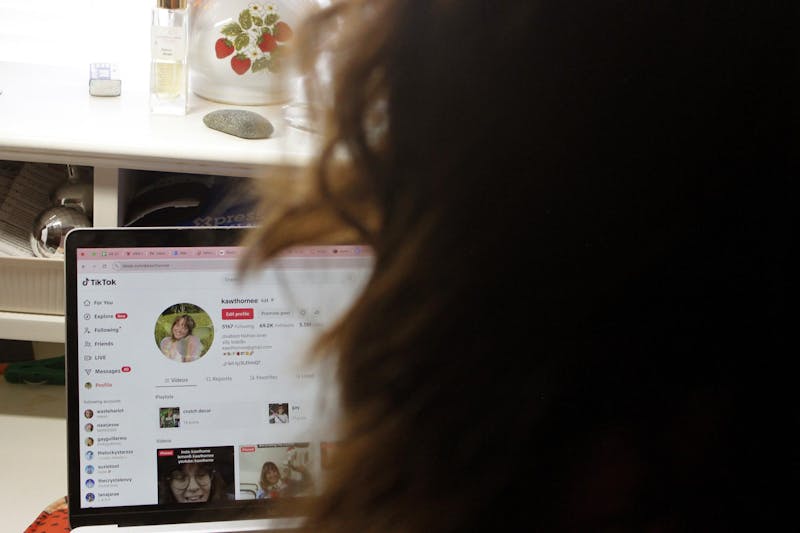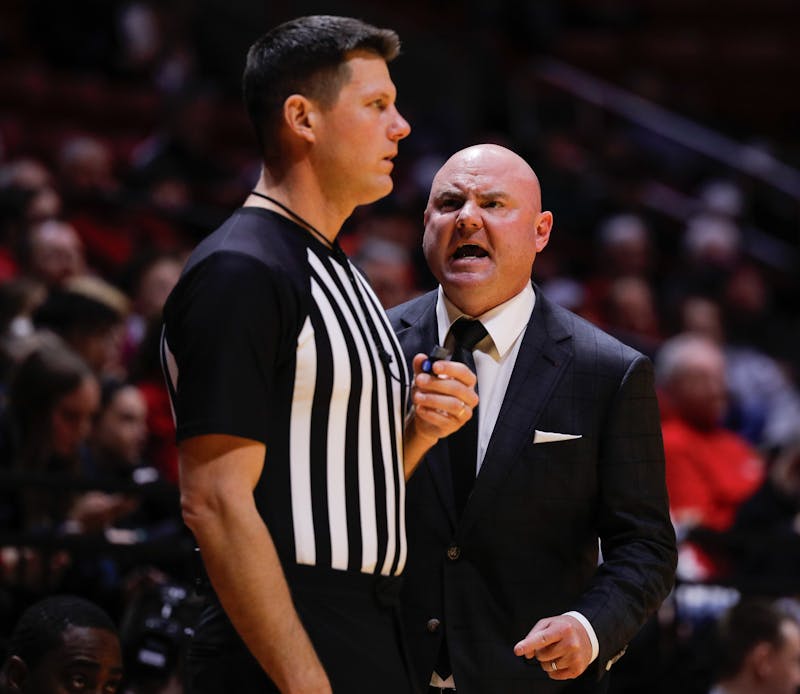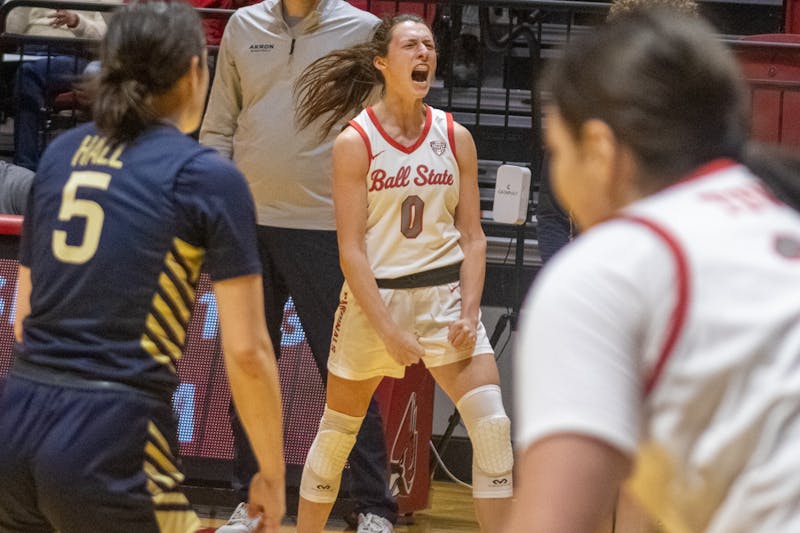Editor’s Note: This article will be updated as and when university personnel respond to questions regarding the slate’s platform points.
With the Student Government Association (SGA) elections underway, The Daily News sat down with the four members of the Bold slate to discuss their platform points.
Claiming to be “one of the most organizationally diverse” of the three slates, Bold’s presidential candidate, Connor Sanburn, said he wanted to ensure diversity among his slate members and their platform points.
Infobox:
Yes = This can be completed/implemented in one year.
Probably = This can be completed/implemented in one year, given some obstacles and/or some current uncertainties.
Maybe = This can be completed/implemented in one year, but there are still questions, unseen obstacles and/or some current uncertainties.
Unlikely = This likely can’t be completed/implemented in one year due to obstacles and/or some current uncertainties.
No = This can’t be completed/implemented in one year.
Unknown = It is unknown if this can be completed/implemented in one year.
The following is a list of the slate’s platform points, accompanied with information we gathered from Ball State faculty and personnel and the feasibility of the platform points.
Pursue intercultural dialogues course for students
Feasibility: Maybe
What they said: This platform point intends on addressing microaggressions and unconscious biases experienced by students, Sanburn said.
He said he plans to have the course start as a pilot program in the Honors College, after which it could be expanded to all students as a University Core Curriculum (UCC) course. However, he doesn’t see the platform point becoming a UCC course within the next academic year.
From what the slate members understand, Sanburn said this platform point should not cost SGA any money.
What we found: As part of the Honors College's strategic plan for inclusive excellence, Emily Rutter, assistant professor of English, said the college is looking at the curriculum and brainstorming ways to respond to student needs.
Rutter, who teaches at the Honors College, said she and her colleagues look forward to working with Jordyn Blythe, vice presidential candidate of Bold, her slate members and other students who have been involved in the strategic plan to consider the best methods to implement intercultural dialogues.
She said the particular form this objective will take is still to be determined.
Push diversity training for all faculty
Feasibility: Unknown
What they said: Under this platform point, Sanburn said, SGA would offer a student perspective to assist the university in creating a diversity curriculum or training program for Ball State’s faculty.
He said the slate members first wish to speak with Marsha McGriff, associate vice president for inclusive excellence, before detailing their own ideas to ensure their plans aren’t completely different.
His slate members intend on gathering student perspectives by holding forums and sending out Google Forms or Qualtrics Surveys to Ball State students.
What we found: McGriff said the Office of Inclusive Excellence already has "a robust training schedule" for Ball State's faculty and staff in place.
She provided a sample of some training sessions designed in coordination with other Ball State administrative departments like the Multicultural Center, Center for Peace and Conflict Studies, Office of Admissions and other Ball State faculty. These trainings focus on subjects like implicit bias, microaggressions, creating a positive classroom environment, understanding Generation Z students and more.
"Feedback is a gift," McGriff said, adding she believes having intentional meetings with academic leadership within academic departments and schools is "a great way to share thoughts and ideas."
Build Counseling Center partnership and host event
Feasibility: Unknown
What they said: Through this platform point, Sanburn said, he and his slate members want to support the Counseling Center and its pursuits in the next academic year — be it creating a type of curriculum or presentation for students, volunteer support, monetary support or any other needs the center might have.
He said they want to keep this platform point open-ended because they aren’t sure what will be “the big campus issue” for the Counseling Center in the next academic year.
While his slate members haven’t allocated a specific cost toward this platform point, he said they wanted to keep the costs low — at or under $1,500.
What we found: William Betts, director of counseling and health services, said he would want to speak with SGA representatives more in-depth before committing to any specific course of action.
Betts confirmed that he did meet with Esposito recently and delivered a presentation to SGA last semester.
Increase accessibility to SafeZone training
Feasibility: Maybe
What they said: Sanburn said he and his slate members aim to help Spectrum and the Counseling Center push more Safezone training at Ball State — meant for people who wish to educate themselves about the LGBTQ+ community and become allies and advocates for members of the community.
While he doesn’t have a cost approximation for this platform point, he said his slate would want to do as many training sessions as SGA can, and as many training sessions Spectrum and the Counseling Center wish to do.
What we found: Eli Lucas, president of Spectrum, said he had a discussion with members of the Bold slate to discuss the updates that have been made at the Counseling Center regarding updates to Safe Zone, as well as Trans Safe Zones.
Betts said the Counseling Center has both revised and updated the Safezone training and developed a one-and-a-half-hour outreach training program about the LGBTQ+ Community and issues faced by persons in this community.
However, he said the information in the latter is not as comprehensive as Safezone training and someone who takes it is not considered Safezone trained. While it was developed by the Counseling Center, Betts said it approached Spectrum for feedback on the training program.
He said the center welcomes discussions on how SGA and the Counseling Center could work together.
Expand metered parking app and grow awareness
Feasibility: Unknown
What they said: Sanburn said this platform point would be focused on advertising the Passport Parking App to Ball State students.
What we found: According to the Passport Parking App, which allows users to pay for parking through their phones, there are two pay-by-app parking locations in the Village and near Ball State.
The app is operated by the City of Muncie and not used by the Ball State’s Parking Services, said Nick Capozzoli, manager of the university's parking services.
Capozzoli said in an email, at this time, there is no plan to implement a parking app for the pay stations on Ball State’s campus.
Explore heated bus stations
Feasibility: Unknown
What they said: Sanburn said he and his slate members wish to help create heated bus stations along Ball State’s bus routes on McKinley Avenue.
He said one factor to look into is routing electricity to the stations and seeing what manufacturers are able to sell these products and then install them onto campus.
Amanda Mustaklem, treasurer candidate for the slate, shared one example of a heated lamp they were looking into that costs around $1,600, but said the slate members were looking into cheaper and durable options. She estimated the total cost at around $6,000
Gina Esposito, secretary candidate for Bold, said they didn’t want to allocate a fixed cost for the bus stations as there were other things the slate was campaigning on that would cost them money.
What we found: Jim Lowe, associate vice president for facilities planning and management, said Ball State already has two heated and covered bus stations at the north and south locations of the McKinley Avenue bus routes.
Lowe said the university and SGA needs to be very prudent in the ways it uses student and state funds. As it undertakes projects, he said the university need to choose designs that are economically feasible.
He said the university uses quartz infrared heaters in bus shelters on campus — which he said was the most efficient way to provide a source of warmth in open and enclosed bus shelters.
Continue Map App updates for individuals with disabilities
Feasibility: Unknown
What they said: Sanburn, who also serves as a project manager specialist for Digital Corps, the organization that manages the map app, said updates for the app include might include an audio function for people with hearing disabilities and a function for the screen to enlarge the image for users who difficulty viewing the map.
What we found: The Daily News is awaiting a response from Kyle Parker, senior software engineer at Digital Corps, regarding this platform point.
Encourage reduced plastic bag use in dining facilities
Feasibility: Unknown
What they said: Sanburn said the slate isn’t completely pushing for replacing the plastic bags with paper bags on campus, but rather encourage students to use the reusable bags given to them by Ball State.
One suggestion he said was instead of having plastic bags available right next to the dining location, students could request a plastic bag from the cashier when they check out or use their own reusable bag.
What we found: The Daily News is awaiting a response from Karen Adkins, director of dining services and dining initiatives, regarding this platform point.
Explore motion-sensored lighting
Feasibility: Unknown
What they said: This platform point focuses on installing motion-sensored lighting in the hallways of on-campus buildings, Esposito said.
In addition to trying to save the university money and energy, Blythe said this platform point might help improve student safety on campus.
Sanburn said that the start for this platform point will be advocating for the installation of these types of lights, which could later on turn into an actual plan.
What we found: The Daily News is awaiting a response from Lowe regarding this platform point.
Pilot free menstrual hygiene products in select buildings
Feasibility: Unknown
What they said: Esposito said there are several companies that make feminine hygiene products at an affordable cost that would allow the free products to be added to SGA’s budget.
However, Mustaklem said there is no fixed cost for this platform point and the slate members would be flexible with the costs. Depending on the building in which the products will be piloted, she said they had allocated around $10,000 in SGA’s budget, thought that figure was subject to change based on whether they were able to gain any support from the university.
Some locations being considered by the slate members for the pilot program of these products include the L.A. Pittenger Student Center, the lower levels of Bracken Library and the unisex bathroom in the Atrium.
What we found: Lowe said the university addressed restroom hygiene or sanitary napkin bins several months ago through a request from Spectrum.
Improve organization connections with SGA
Feasibility: Unknown
What they said: Blythe said she felt SGA has a strong presence around election time each year, and then students and organizations lose interest.
The slate members wish to keep in contact with student organizations they met with during the campaign trail and get in contact with more organizations.
This platform point will come at no expense they said as the slate will just be in contact with other organizations to better represent their needs in the senate.
Charles Melton and John Lynch contributed to this story.
This story will be updated.
Contact Rohith Rao with comments at rprao@bsu.edu or on Twitter @RaoReports.





The Daily News welcomes thoughtful discussion on all of our stories, but please keep comments civil and on-topic. Read our full guidelines here.